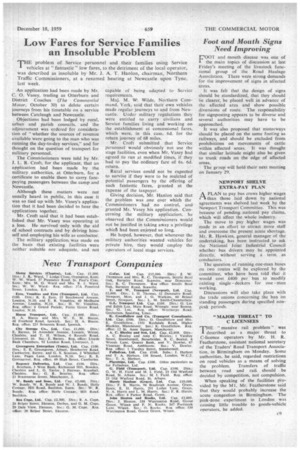Low Fares for Service Families an Insoluble Problem
Page 47

If you've noticed an error in this article please click here to report it so we can fix it.
1HE problem of Service personnel and their families using Service
vehicles at " fantastic " low fares, to the detriment of the local operator, was described as insoluble by Mr. I. A. T. Hanlon, chairman, Northern Traffic Commissioners, at a resumed hearing at Newcastle upon Tyne, last week.
An application had been made by Mr. C. 0. Vasey, trading as Otterburn and District Coaches (The Commercial Motor, October 30) lo delete certain journeys from his timetable on a service between Cateleugh and Newcastle. Objections had been lodged by rural, urban and parish councils, and the adjournment was ordered for consideration of "whether the sources of revenue available were going to the man who was running the day-to-day services," and for thought on the question of transport for military personnel. The Commissioners were told by Mr. J. L. R. Croft, for the applicant, that an application had been made by the military authorities, at Otterburn, for a certificate to enable them to carry farepaying passengers between the camp and Newcastle. Although these matters were not usually heard in public, in this case it was so tied up with Mr. Vasey's application that it had been decided to hear the applications together. Mr. Croft said that it had been established that Mr. Vasey was operating at a loss. He survived only with the aid of school contracts and by driving himself and employing his wife as conductoi, The military application was made on thebasis that existing facilities were neither suitable nor adequate, and not capable of being adapted to Service requirements. Maj. M. Wilde, Northern Command, York, said that their own vehiclesmade regular journeys to and from Newcastle. Under military regulations they were entitled to carry civilians and Service families living and working on the establishment at concessional fares, which were, in this case, 6d. for the return journey of 68 miles. Mr. Croft submitted that Service personnel would obviously not use the stage facilities, even when Mr. Vasey had agreed to run at modified times, if they had to pay the ordinary fare of 6s. 6d. return. Rural services could not be expected to survive if they were to be mulcted of potential passengers by the offering of such fantastic fares, granted at the expense of the taxpayer. Giving decision, Mr. Hanlon said that the problem was one over which the Commissioners had no control, and granted Mr. Vasey his application. Concerning the military application, he observed that the Commissioners would not be justified in taking avvay a privilege whicni had been enjoyed so long. He hoped, however, that whenever the military authorities wanted vehicles for private hire, they would employ the operators of local stage services.












































































































